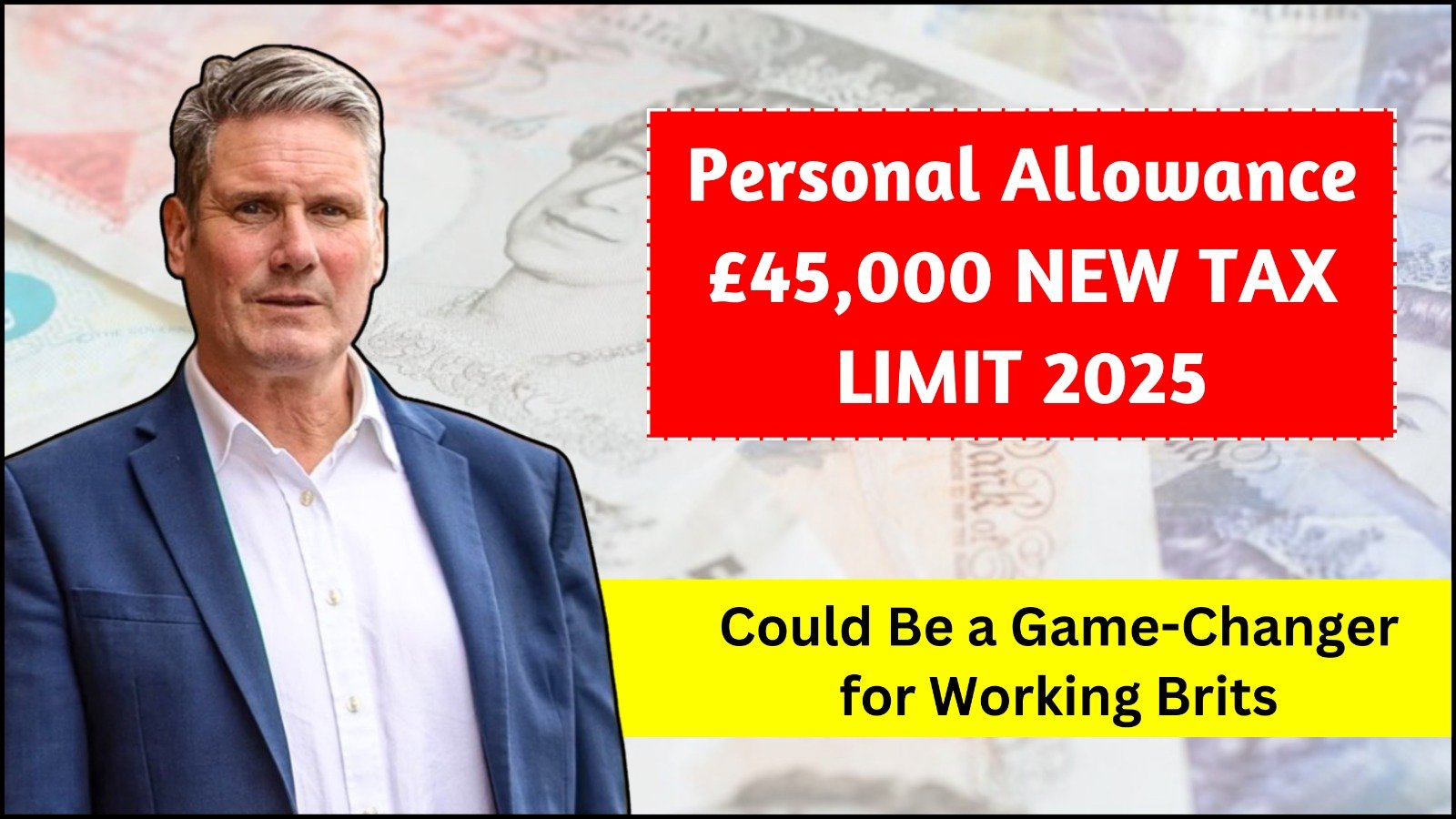A groundbreaking proposal is generating significant debate across the UK—raising the Personal Allowance to £45,000. With inflation straining household budgets and millions struggling to make ends meet, experts and campaigners believe it’s time for a radical change to the income tax structure.
If implemented, this plan would mark one of the largest personal tax reforms in British history, transforming how earnings are taxed and offering major relief to low and middle-income workers.
Overview
| Category | Current (2025) | Proposed Reform |
|---|---|---|
| Personal Allowance | £12,570 | £45,000 |
| Tax on £30,000 income | ~£3,486 | £0 |
| Basic Rate Band Starts At | £12,571 | £45,001 |
| Number of Beneficiaries | 30+ million workers | All income taxpayers |
| Estimated Annual Cost | N/A | £100+ billion |
| Main Benefit | Increased take-home pay | Reduced income tax burden |
How the Personal Allowance Works in 2025
Currently, the Personal Allowance—the amount of income you can earn tax-free—is £12,570. Beyond this threshold, individuals pay income tax based on set tax bands:
| Income Range (2025) | Tax Rate | Description |
|---|---|---|
| Up to £12,570 | 0% | Tax-free Personal Allowance |
| £12,571 – £50,270 | 20% | Basic rate |
| £50,271 – £125,140 | 40% | Higher rate |
| Over £125,140 | 45% | Additional rate |
Critics argue that taxing earnings above just £12,570 is outdated and places an unfair burden on modest earners, especially given that wages have stagnated while costs for essentials like housing and energy have surged.
The Proposed £45,000 Personal Allowance
A bold new policy suggestion seeks to increase the Personal Allowance to £45,000, a move that could reshape income tax for workers across the country.
What the Proposal Would Do:
- Eliminate income tax for anyone earning below £45,000
- Allow higher earners to enjoy £32,430 more in tax-free income
- Reduce the effective tax rate for millions, especially middle-income earners
- Offer broad relief amid inflation, helping both employed and self-employed individuals
This policy would mean that a worker earning £30,000 annually would pay zero income tax under the proposed system, compared to more than £3,500 in tax under current rules.
Who Would Benefit?
The biggest winners would be working families, young professionals, and self-employed individuals whose earnings fall below or just above the proposed new threshold. But even high earners would benefit from the additional tax-free allowance, despite still paying tax on income above £45,000.
Groups Likely to Benefit Most:
- Low- to middle-income earners
- Young graduates entering the workforce
- Families struggling with rent, energy, and food bills
- The self-employed, freelancers, and gig economy workers
- Higher earners (though their relative benefit is smaller)
Though the reform would help all taxpayers, its proportional benefit is greatest for those currently paying 20% on most of their earnings.
Why Many Support Raising the Personal Allowance
Campaigners say the current tax thresholds no longer reflect modern living costs and argue that the system penalises productivity and discourages work.
Supporters of the proposed increase argue it would:
- Let workers keep more of their income
- Reduce reliance on means-tested welfare and in-work benefits
- Stimulate consumer spending, benefiting local businesses
- Help rebuild the post-inflation economy
- Encourage greater workforce participation
In short, raising the Personal Allowance is seen not just as a tax break, but as a stimulus tool to ease the cost-of-living crisis and boost long-term economic growth.
Economic Implications and Costs
The proposal would significantly reduce income tax revenue in the short term. Some estimates suggest it could cost the government over £100 billion per year.
However, backers of the plan believe this revenue loss could be counterbalanced by:
- Higher VAT and corporate tax revenue due to increased consumer demand
- Lower spending on benefits and welfare programs
- Increased employment and productivity if more people are incentivised to work
Still, these benefits are speculative and depend on broader economic trends. The scale of the change means it would require political will and possibly trade-offs in other areas of public spending. The benefit increases would be more effective and equitable than a blanket Personal Allowance increase.
FAQs
Q1:- What is the current UK Personal Allowance?
A = It’s £12,570 per year—the amount you can earn tax-free before paying income tax.
Q2:- How would a £45,000 Personal Allowance affect workers?
A = Anyone earning under £45,000 would pay no income tax, and higher earners would enjoy more tax-free income.
Q3:- Would this proposal cost the government money?
A = Yes, but supporters believe it could be offset through growth, reduced welfare spending, and increased indirect taxes.










